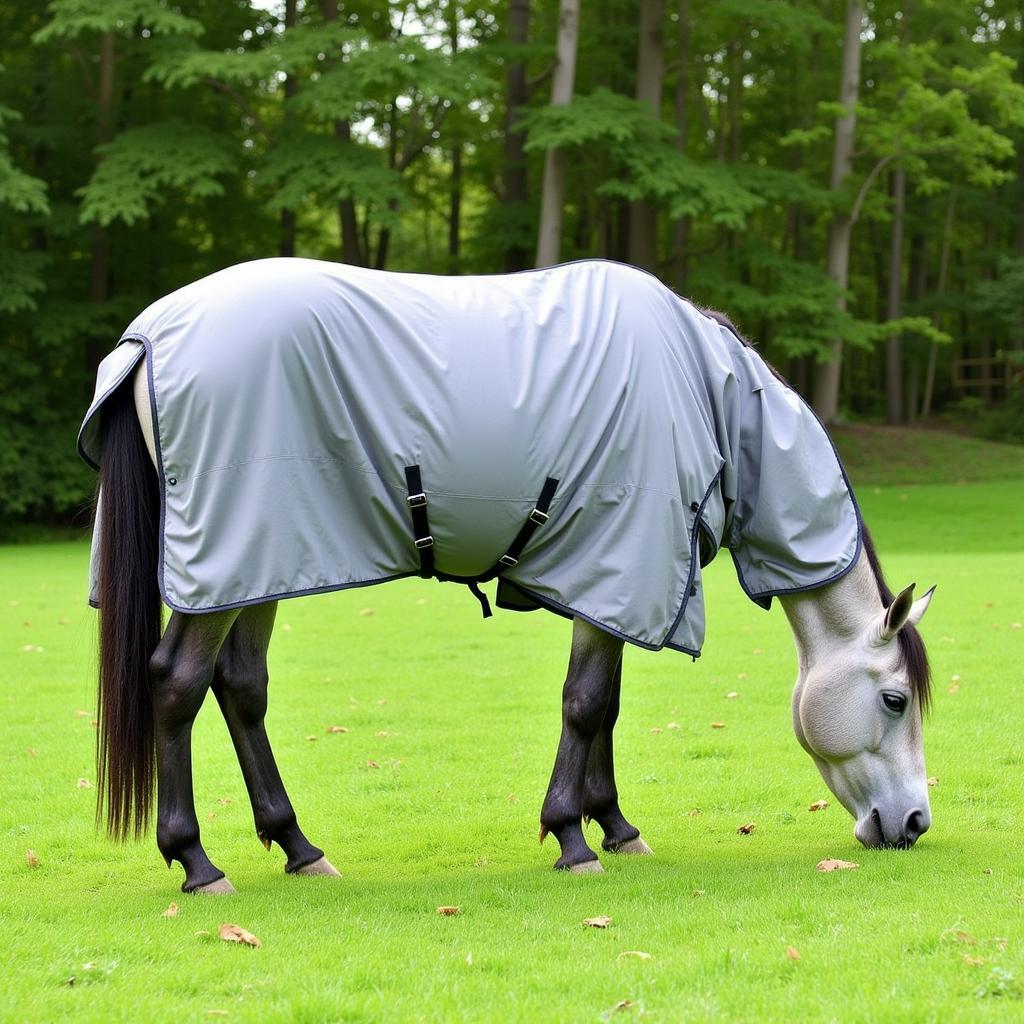Horse Bathing Suits – a curious concept that sparks both amusement and genuine questions. Do they exist? Why would a horse need one? If you’ve ever wondered about this unique equestrian accessory, you’re in the right place. Let’s dive into the world of horse swimwear, separating fact from fiction and exploring the reasons behind its existence, if any.
A common misconception is that horse bathing suits are like human swimwear, designed for recreational swimming. This is largely untrue. While some horses do enjoy a dip in the water, a full-blown “bathing suit” isn’t a typical equestrian item. The term “horse bathing suit” more commonly refers to protective garments used for various purposes, from therapeutic treatments to shielding horses from insects.
Understanding the Need for Horse “Bathing Suits”
What situations might necessitate the use of something resembling a horse bathing suit? Here are a few common scenarios:
-
Hydrotherapy: Injured or recovering horses often benefit from hydrotherapy, which can involve submerging the horse in water. In these cases, a close-fitting suit can help streamline the horse’s body in the water and protect any wounds.
-
Wound Care: Specialized “suits” or wraps can be used to keep wounds clean and protected while a horse is undergoing treatment. These coverings prevent contamination and help maintain a moist healing environment.
-
Insect Protection: During fly season, certain types of close-fitting mesh sheets can offer horses relief from biting insects. These are sometimes referred to as “bathing suits” due to their full-body coverage. These suits can be especially helpful for horses sensitive to insect bites. Check out our article about rain sheet for horses for information about protective gear for horses.
-
Show Preparation: While not strictly a “bathing suit,” some show horses are coated in specialized clays or wraps to enhance their coat’s appearance. These treatments could be perceived as a form of “suit” due to their temporary and full-body nature.
Types of Horse “Bathing Suits”
While a traditional swimsuit isn’t common, various protective coverings serve similar functions. These include:
-
Compression Suits: Designed for support and recovery, these suits can aid in circulation and reduce inflammation.
-
Fly Sheets: Made of lightweight mesh, these offer a barrier against flies and other insects. They can range from simple sheets to full-body coverage resembling a “suit.”
-
Therapeutic Wraps and Boots: While not full-body suits, these targeted coverings protect and support specific areas of a horse’s body during treatment or rehabilitation.
Debunking the Myth of Recreational Horse Swimwear
It’s important to remember that horses aren’t naturally strong swimmers. While some may enjoy wading or splashing in shallow water, they are not built for prolonged or deep-water swimming like humans. A Dapple Gray Arabian Horse known for its elegance and athleticism, might enjoy a splash, but wouldn’t be found in a true bathing suit. Thus, the need for a recreational “horse bathing suit” is generally non-existent.
Are Horse Bathing Suits Necessary?
The necessity of a “horse bathing suit” depends entirely on its intended purpose. For therapeutic uses, specialized coverings are crucial for a horse’s recovery and well-being. For insect protection, fly sheets and similar garments provide much-needed relief. However, for recreational swimming, these suits are unnecessary and even potentially harmful.
“Hydrotherapy can significantly benefit a horse’s recovery, especially after injuries. A tailored suit ensures proper support and hygiene during these treatments.” – Dr. Amelia Cartwright, Equine Veterinarian.
 Horse protected from insects by a fly sheet in a pasture
Horse protected from insects by a fly sheet in a pasture
Choosing the Right “Bathing Suit” for Your Horse
If you believe your horse could benefit from a protective covering, consult with a veterinarian or equine professional. They can assess your horse’s specific needs and recommend the most appropriate solution. This might be a Flea Bitten Grey Quarter Horse needing protection from insects, or a Dapple Gray Quarter Horse undergoing hydrotherapy. Choosing the correct garment, whether it’s a compression suit or a fly sheet, ensures both comfort and effectiveness.
“Remember, a well-fitting suit, designed for a specific purpose, is key to ensuring your horse’s comfort and the treatment’s success.” – John Davies, Certified Farrier.
In conclusion, while the image of a horse sporting a bikini might bring a smile, the reality of “horse bathing suits” is rooted in practicality. These specialized garments play a vital role in therapeutic treatments, wound care, and insect protection. Understanding their true purpose allows horse owners to make informed decisions about their horse’s health and well-being. The next time you hear the phrase “horse bathing suit,” remember its function, not its fashion statement.
FAQ
- Do horses need bathing suits for swimming? No, horses are not strong swimmers and generally don’t require or benefit from swimwear.
- What is a horse bathing suit actually used for? “Horse bathing suits” typically refer to protective coverings used for hydrotherapy, wound care, or insect protection.
- Where can I purchase a horse “bathing suit”? Consult with your veterinarian or an equine supply store for appropriate protective garments for your horse.
- Are horse bathing suits expensive? Prices vary depending on the type and purpose of the covering.
- What is the most common type of “horse bathing suit”? Fly sheets and therapeutic wraps are the most commonly used types of protective coverings.
- How do I choose the right “bathing suit” for my horse? Consult with a veterinarian or equine professional for recommendations based on your horse’s individual needs.
- Can a horse bathing suit be harmful? Improperly fitted or used garments can restrict movement or cause discomfort. Always consult a professional for guidance.
Looking for more information? Check out our article about the head of the bay horse show.
When in need, contact us at Phone: 0772127271, Email: [email protected] or visit us at QGM2+WX2, Vị Trung, Vị Thuỷ, Hậu Giang, Việt Nam. Our customer care team is available 24/7.